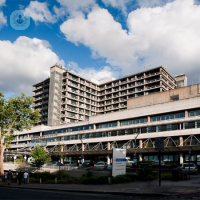Lymph nodes
Mr Sudeendra Doddi - Surgery
Created on: 11-13-2012
Updated on: 03-30-2023
Edited by: Conor Dunworth
What are lymph nodes?
Lymph nodes, also known as lymph glands, are small glands found throughout the body, and form a part of the lymph system. The lymph system is a network of organs and vessels that carries fluid around the body between tissue and the blood. The fluid contains white blood cells called lymphocytes.
The lymph system is an integral part of the immune system, as it is responsible for fighting off diseases and infections.

Where are they found in the body?
Lymph nodes can be found on their own, or in groups. You can feel groups of lymph nodes in the neck, groin, and underarms. Generally, most lymph nodes cannot actually be felt in the body, but if they are swollen in the neck, they can certainly be felt and are quite noticeable.
What is the role of lymph nodes?
Lymph nodes help to fight off disease, and they do so by filtering the lymph fluid and trapping any bacteria or viruses that pass through them. They are then destroyed by the lymphocytes, in an effort to destroy such substances before they infect other parts of the body.
What does it mean if my lymph nodes are swollen?
When lymph nodes are swollen, it usually means that they are exposed to bacteria and viruses, and are thus likely to be fighting off an infection. However, more rarely, swollen lymph nodes could be caused by an underlying condition such as cancer.
When should I see a doctor?
For patients experiencing swollen lymph nodes, it is recommended that a doctor is seen if:
- they have been swollen for more than two weeks
- they feel hard
- the swollen lymph nodes are accompanied by a fever
Which specialist treats swollen lymph nodes?
Otolaryngologists are experts when it comes to diagnosing and treating a patient with swollen lymph nodes. An oncologist may be required in the case where cancer is suspected.
How do swollen lymph nodes feel?
Generally speaking, swollen lymph nodes can feel tender or painful. For most people, they will feel like round and soft bumps that are typically roughly the same size as a grape.
What are the likely causes of swollen lymph nodes in the neck?
Commonly, lymph nodes in one's neck that become swollen are caused by either a cold, sore throat, or a tumour or infection in the mouth, head or neck.
What might be the causes of swollen lymph nodes that appear in the armpit, groin, or collarbone?
Typically, these lymph nodes might swell due to injury or infection in the hands or arms. Less common causes of swollen armpit lymph nodes are breast cancer and lymphoma.
If you notice swollen lymph nodes in your groin area, the most likely cause is an infection or injury to the feet, legs, groin or genitals. Less common causes of swelling in the groin lymph nodes are lymphoma, melanoma or testicular cancer.
If the glands just above your collarbone are swollen, then there is likely an infection or injury in the breasts, neck, lungs or abdomen.

How long does it take for the swelling in swollen lymph nodes to go down?
The swelling should start to go down within two weeks.
What can I do at home to ease the swelling?
To ease the swelling caused by swollen lymph nodes, make sure you rest at home as much as you possibly can, stay as hydrated as possible, and, if necessary, it is a good idea to take painkillers such as paracetamol or ibuprofen.
When should I be worried about my swollen lymph nodes?
The rule of thumb is that if pain caused by swollen lymph nodes lasts for more than seven days, you should certainly seek medical attention to find out what the exact cause is. Also, if your lymph nodes suddenly become enlarged with no clear reason (such as a cold, sore throat, or injury), medical attention should be sought in order to either diagnose or rule out an underlying medical condition.
What are the signs that I have a cancerous lymph node?
There are many warning signs that may indicate a cancerous lymph node. The most common ones include the following:
- loss of appetite
- itchy skin
- unexplained weight loss
- night sweats
- lumps under the skin





